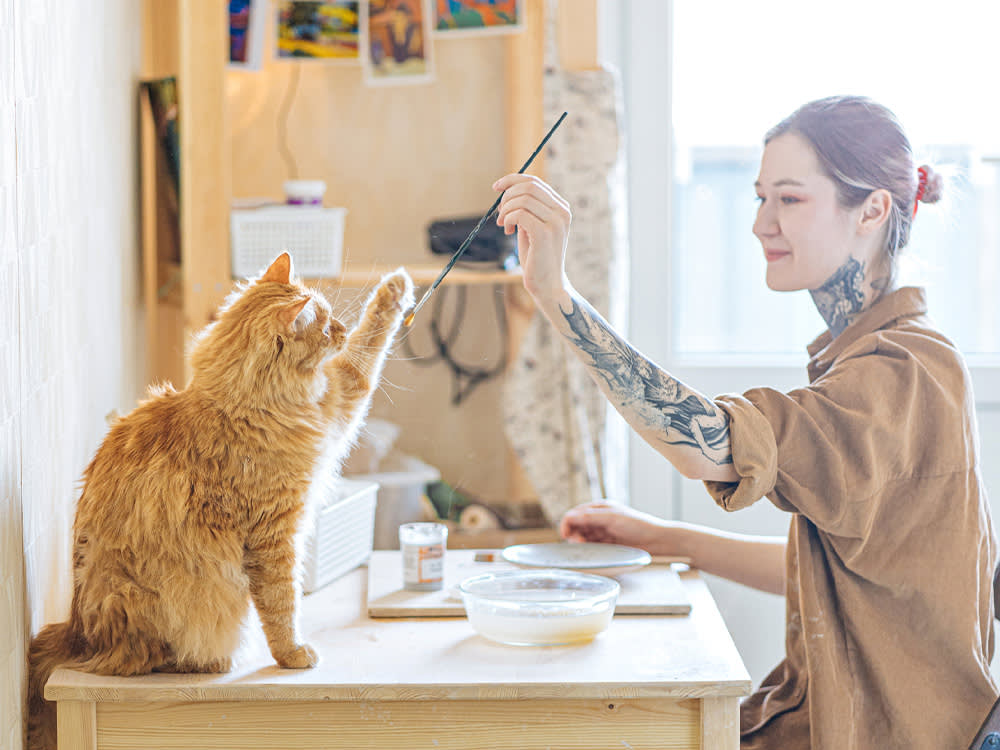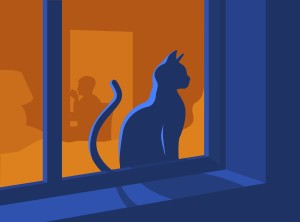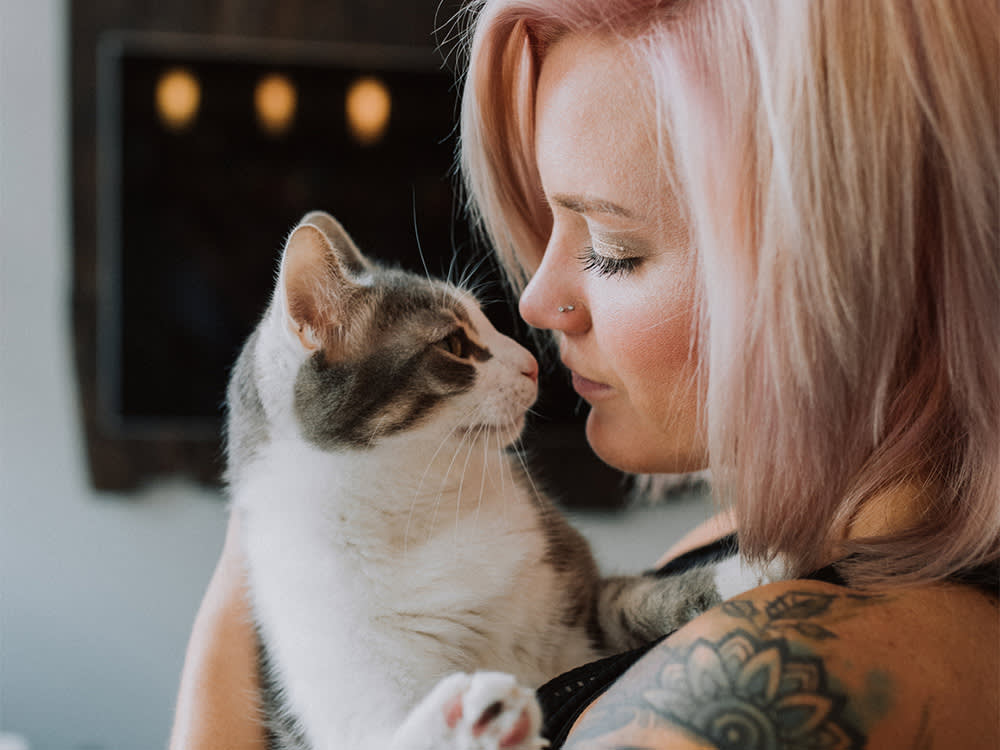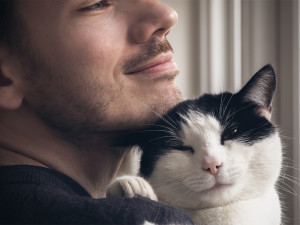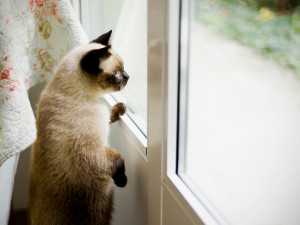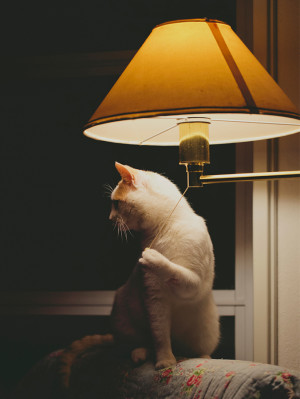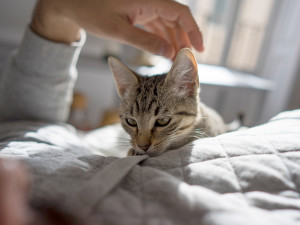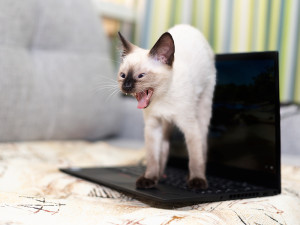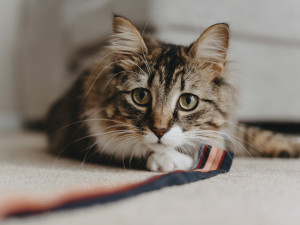10 Signs Your Cat Has Imprinted on You
Feeling like you have a little shadow these days? Here’s why that’s happening.
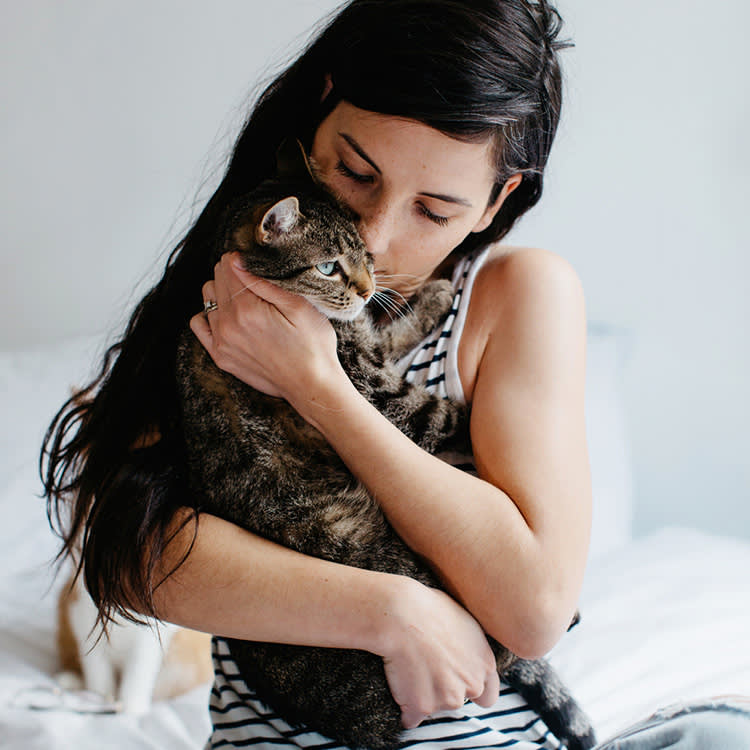
share article
In this Article:
Signs of cat imprinting opens in a new tab How to tell if a cat has imprinted on youopens in a new tab What does imprinting meanopens in a new tab
We’ve all seen videos of dogs reuniting with humans they haven’t seen in weeks (or even years) and going into absolute paroxysms of pleasure. But what about cats? They tend to be less demonstrably affectionate than dogs, but a cat’s imprinting instinct is still strong, says Los Angeles-based certified feline training and behavior specialist and The Wildest Collective member Cristin Tamburo opens in a new tab(aka The Cat Counseloropens in a new tab). Recognizing it is just a matter of knowing what to look for. Here are 10 signs your cat has imprinted on you, plus the reasons why they act so kooky sometimes.
What does it mean when a cat imprints on you?
Cat imprinting can mean several things, but typically it is defined by an establishment of trust. “Imprinting is something that happens during the sensitive, early development period of an animal’s life,” Tamburo says. “During this stage, an animal will (hopefully) build bonds or attachments — usually with their (cat) parents or the person who is taking care of them.”
What are the signs your cat has imprinted on you?
When a cat has imprinted on you, there are several unmistakable signs of their deep attachment. First, they display an intense and consistent desire for your company. They may follow you around the house, sit near you, or seek physical contact, such as snuggling or kneading. Imprinted cats often exhibit a unique vocalization — a specific sound reserved for their chosen person, signaling their need for attention or companionship.
Additionally, they may display signs of distress or anxiety when separated from you for extended periods. Imprinted cats tend to be highly responsive to your voice, gestures, and facial expressions, and they may even mimic your behavior in subtle ways. Ultimately, their trust and comfort around you become evident through relaxed body language, purring, and slow blinking, which signifies a deep sense of contentment and security in your presence.
To sum up, your cat has imprinted on you if they:
Communicate with you by meowing, purring, or making other happy noisesopens in a new tab.
Want to be near youopens in a new tab — they follow you around, cuddle you, sleep with you, and want to be on your lap whenever they get the chance.
Enjoy playing with you and even instigating playopens in a new tab.
Bring you “gifts” and go on “hunting” excursions for youopens in a new tab.
Display their trust by showing you their bellyopens in a new tab! (Although this may not be an invitation to touch said belly.)
How to tell if a cat has imprinted on you
If a cat has imprinted on you, they will strongly bond with you and seek your attention and affection. Cats may show their affection by becoming your shadow, following you wherever you go. They may demand constant attention with a loud barrage of meows, purrs, and other vocalizations — or they may be more content to be left alone. Every cat displays affection differently; it’s up to you to read your cat’s love languageopens in a new tab.
At what age do kittens begin to imprint?
“The initial imprinting stage for kittens tends to occur between two and seven weeks after birth,” Tamburo says. “Though a very short window in a cat’s relatively long life, the stimuli that they are and are not exposed to during this time can really shape their behaviors and personality for the rest of their lives.”
After eight weeks, once a kitten has imprinted on their mother and littermates, the next stage of socialization begins — connecting with humans. “Additional socialization also occurs through their first four months, which is why, in the rescue world, we generally try to get kittens socialized and trusting humansopens in a new tab by this four-month mark.”
So, a person shouldn’t try to take a kitten away from their mother too early, in the hopes of getting them to imprint with them more strongly? “Kittens need and deserve time with their mothers and siblings. It’s important for their overall development,” Tamburo says.
Can older cats imprint on you?
Yes, older cats can imprint on you, though it may take a bit longer and manifest in different ways. Socialization after four months is still possible but can be more challenging. “Cats, like humans, imprint throughout their lives,” Tamburo says. “[Once] properly socialized, cats will often become imprinted on a human, even if they were not together during that early, sensitive period.” Older cats may be more likely to get attached to one person. “Often, this will occur with whichever human in the home provides the cat with the most care and attention,” Tamburo says.
Are certain breeds more likely to imprint than others?
Siamese, Ragdoll, Sphynx, and Maine Coon cat breedsopens in a new tab tend to be needier and are more likely to imprint on a person. Some cats can be too attached to you. Separation anxiety can be a real issue for cats (just like for dogs), especially for those adopted during the pandemic, who got used to having their humans around all the time and now have to adjust to them spending more time out of the house.
Do some cats show fake affection?
Cats don’t “fake affection” to get more food or be let outside, but they do use their body language to communicate their needs to you. Every cat is different, though, so how they express affection or demonstrate their bond with their person is different, too. But the desire to imprint — to connect and trust — is hardwired into cats (and humans). It’s a survival instinct.
“This is something we usually see in stray or feral cats, who may have missed their socialization period but still trust that one human who cares for them,” Tamburo says. “For instance, a colony of feral cats will likely run from most humans but will be excited to see the person who feeds them and cares for them. In some cases, they may show affection, but often they will accept the food and go back to their daily routine.”
Does my cat know I love them?
While cats might not understand the concept of love, they do pick up on the affection you show them, your body language, and the care you provide them. All that love helps your cat build a strong bond with you. Even the grumpiest cats can sense the love and affection a person shows them; they just don’t always return it in a way that’s super obviousopens in a new tab.
Explaining common cat imprinting behaviors:
From kneading at your legs and sweatshirts to bringing you random objects, here's why cats do some pretty quirky things.
Why is my cat always meowing or vocalizing at me?
Your cat may be meowing or vocalizing at you because they are trying to communicate something to you. It may be that they’re hungry, want attention, or are upset — or, they could just be saying hi. If you think your cat’s meowing is excessive, it's worth making an appointment with your veterinarian to get them checked out.
Why does my cat knead at me?
Your cat kneading at you is actually a sign of affection. It shows that they feel bonded to you and almost see you as a mother figure. They knead at you to seek comfort in your scent and presence. So, yes, you can take it as a compliment!
Why does my cat follow me everywhere?
When your cat shadows you from room to room, it can be super cute (when not a major tripping hazard). Cats follow peopleopens in a new tab around for a number of reasons: to get attention, because they love you, or they’re hungry or need something. Your cat knows you are their main source of food and attention, so they’re bound to follow you around wherever you go.
Why does my cat run to me when I come home?
Your cat runs to you when you come home because they know you are part of their world and they trust you. You’ve probably noticed that they do the opposite when a stranger comes over (they tend to keep their distance). Your cat may also run to you for a very simple reason: They’re hungry and want food.
Why does my cat rub on my legs?
Your cat could be rubbing on your legs for a number of reasons but the main one is they are showing you affection. A few other reasons include: They want your attention, they’re “marking” you as their territory, they’re hungry, or they want to play.
Why does my cat always want to play?
The likely reason your cat wants to play is because they’re bored. Just like kids, they need lots of stimulation — and exercise. Playing with them will improve their mental health by reducing anxiety and stress.
Why does my cat bring me objects?
Usually, a cat brings you objects when they are bored and want to play. They could also bring you a toy or object because the want a reward for their “prey.” Another possibility is they are showing you their deep affection.
Why does my cat lick me?
Cats often use their sandpaper tongue to give you some much-needed grooming, a form of affection. But when it’s not about love, cats lick peopleopens in a new tab to mark their territory, to get your attention, or because they’re feeling a little stressedopens in a new tab out.
Why does my cat slow blink at me?
It might feel creepy, but your cat slow blinks at you because they trust you. Slow blinking is a sign that they are comfortable and relaxed in your presence.
Why does my cat show me their belly?
If your cat shows you their belly, that means they feel comfortable around you. It means they trust you enough to expose their most vulnerable areas. That said, it doesn’t necessarily mean they want you to rub their belly!
Why does my cat bite me?
Sometimes cats will gently bite on your fingers and hands during a petting session. These light nibbles can be a sign of affection from mouthy kitties. But watch out for subtle warning signs for strong cat bitesopens in a new tab, such as tail swishing or staring, indicating a cat is feeling a bit overwhelmed.
Why does my cat sleep on me?
Cats will sleep on their humansopens in a new tab as a sign of affection to show how much they want to be near you. Cats can feel comfort from the sounds of your breathing and heart beating and your body’s warmth. You may even notice them slow blinkingopens in a new tab to communicate just how comfortable they are.
FAQS (people also ask):
How do you tell if a cat imprinted on you?
You can tell your cat has imprinted on you when they communicate happy meows and purrs, follow you around, sleep and cuddle with you, and show you their belly.
What does it mean when a cat has imprinted on you?
When a cat has imprinted on you, this means that they trust you and have a strong bond with you. They feel at ease with you because you make them feel safe, happy, and well-cared for.
Do cats get attached to one human?
Cats form deep bonds with their humans and can get attached to one or more people depending on their history, personality, and socialization.
Does a cat trust you if they sleep next to you?
Yes, a cat trusts you if they sleep next to you. Sleeping, cuddling, and following you around are signs that a cat has formed a bond with you.
Should you hug your cat?
Generally speaking, cats do not like to be hugged or constrained. But each cat has their own personality and preferences, so some cats may enjoy being cuddled and hugged while others may prefer to be left alone.
How attached do cats get to their people?
Studiesopens in a new tab show that cats can actually become as attached to their pet parents as dogs — they just express their affection differently.
Do cats show fake affection?
No, cats do not show fake affection or exaggerate their feelings but they do use their body language to communicate their needs to you.
References
Gentle Cat Love Bites: What Do They Mean? Feline Behavior Explainedopens in a new tab
Cats are only pretending to be indifferent to humans, claims studyopens in a new tab
The Mechanics of Social Interactions Between Cats and Their Ownersopens in a new tab
The Urinary Hormonal State of Cats Associated With Social Interaction With Humansopens in a new tab
Phonetic Methods in Cat Vocalisation Studies: A report from the Meowsic projectopens in a new tab

Charles Manning
Charles Manning is an actor, writer, and fashion/media consultant living in New York City with his two cats, Pumpkin and Bear. Follow him on Instagram @charlesemanningopens in a new tab.
Related articles
![cat snuggling man]() opens in a new tab
opens in a new tabWhat’s Your Cat’s Love Language?
Five surprising ways cats show affection (and how you can show it back), according to a cat behaviorist.
![Siamese cat standing on two feet in order to look out of the window]() opens in a new tab
opens in a new tabHow to Ease Your (Cat’s) Return-to-Office Anxiety
A veterinarian and a behaviorist’s tips for preparing your cat for your new WFO schedule.
![White cat switching on lamp on couch]() opens in a new tab
opens in a new tabWhy Does Your Cat Wake You Up at Night?
You want to sleep, your cat wants to party. Here’s how to deal.
![kitten sleeping on top of person]() opens in a new tab
opens in a new tabWhy Does My Cat Sleep on Me?
Not into cuddling? Too bad — they’re spending the night.
![An angry and hissing Siamese kitten standing on top of a laptop computer in the living room]() opens in a new tab
opens in a new tabYou Don’t Have to Live Like This—You Can Get a Trainer For Your Cat
Tips to help you find a legit behaviorist (according to a veterinary behaviorist).
![A cute cat laying on the ground with wide eyes]() opens in a new tab
opens in a new tabWhy Do Cats Slow Blink?
Here’s what your cat’s favorite move means.

